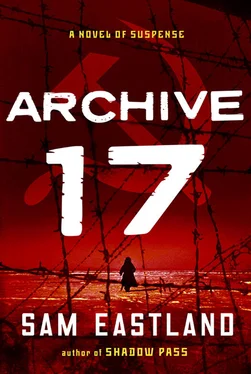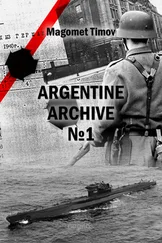Sam Eastland - Archive 17
Здесь есть возможность читать онлайн «Sam Eastland - Archive 17» весь текст электронной книги совершенно бесплатно (целиком полную версию без сокращений). В некоторых случаях можно слушать аудио, скачать через торрент в формате fb2 и присутствует краткое содержание. Жанр: Исторический детектив, на английском языке. Описание произведения, (предисловие) а так же отзывы посетителей доступны на портале библиотеки ЛибКат.
- Название:Archive 17
- Автор:
- Жанр:
- Год:неизвестен
- ISBN:нет данных
- Рейтинг книги:3 / 5. Голосов: 1
-
Избранное:Добавить в избранное
- Отзывы:
-
Ваша оценка:
- 60
- 1
- 2
- 3
- 4
- 5
Archive 17: краткое содержание, описание и аннотация
Предлагаем к чтению аннотацию, описание, краткое содержание или предисловие (зависит от того, что написал сам автор книги «Archive 17»). Если вы не нашли необходимую информацию о книге — напишите в комментариях, мы постараемся отыскать её.
Archive 17 — читать онлайн бесплатно полную книгу (весь текст) целиком
Ниже представлен текст книги, разбитый по страницам. Система сохранения места последней прочитанной страницы, позволяет с удобством читать онлайн бесплатно книгу «Archive 17», без необходимости каждый раз заново искать на чём Вы остановились. Поставьте закладку, и сможете в любой момент перейти на страницу, на которой закончили чтение.
Интервал:
Закладка:
Realizing that this would be tantamount to suicide, the Czechs refused. In spite of Masaryk’s plea for it to remain neutral, the legion renamed itself the Czechoslovak Revolutionary Army, vowed to fight through to Vladivostok, and continued with the journey.
Most regional governments were no match for the Czechs and their armored train convoys, but they encountered increasingly fierce resistance at Irkutsk. Farther to the east, Czech trains were involved in heavy fighting around Khabarovsk.
Czechs who had already reached the safety of Vladivostok stood ready to come to the assistance of their comrades, but were confused by contradictory reports about the clashes taking place, in some cases only forty miles away, and by Masaryk’s continued demands that all Czechoslovakians remain neutral.
This confusion was resolved when, on June 28, 1918, the Czechs learned that weapons being sent west by Bolsheviks in Vladivostok were being used against their countrymen. The Czechs immediately overwhelmed the Vladivostok Bolsheviks and, on July 11, headed west to help their friends, using a spur of the Trans-Siberian Railroad which travels through China and is known as the Chinese Eastern Railway.
Caught between Czech troops advancing from both directions was the city of Ekaterinburg. Unknown to the Czech Legion at the time, the Tsar and his family were being held prisoner in Ekaterinburg, in the house of a merchant named Ipatiev.
Fearing that the Czechs would liberate Nicholas II, the order was given to execute the Tsar. The executions were carried out on the night of July 17, 1918. The bodies were then doused with acid and buried in a nearby forest, where they remained hidden for most of the twentieth century. In 1991, they were finally exhumed and identified using DNA from surviving members of the Romanov bloodline, including Prince Philip, Duke of Edinburgh and husband of Queen Elizabeth II.
Meanwhile, Czechoslovakian troops under the command of General Gaida succeeded in opening up the Trans-Siberian Railroad all the way from Vladivostok to Kazan, clearing the way for the remaining Czechoslovakians to reach the safety of the coast.
Elsewhere in the world, the odyssey of the Czechoslovakians had not gone unnoticed. Impressed by their phenomenal accomplishments, the governments of Britain, France, and the United States urged the Czechoslovakians to remain in Russia and continue fighting the Bolsheviks.
All of these countries eventually dispatched expeditionary forces to Russia on what was optimistically referred to as a peacekeeping mission but was, in reality, designed to offer assistance in the event that the Reds could be overthrown by an uprising of anti-Bolshevik soldiers. With troops stationed near Vladivostok on the Pacific coast, as well as in the arctic port of Archangel in the west, the U.S. and British governments failed to agree on whether to remain neutral or to intervene in the Revolution and thereby, if successful, to inspire Russians to continue the war against Germany.
In spite of the urgings of world leaders such as Woodrow Wilson to remain neutral, local Allied commanders promised assistance to the Czechoslovakians. In most cases, this assistance never materialized, although British, French, and American soldiers were drawn into other clashes with the Reds, and with disastrous results.
As the situation among the anti-Bolshevik forces grew more and more confused, the Reds were gathering strength.
On September 10, 1918, troops of the Red Guard, led by Leon Trotsky, launched an all-out attack on the Czechoslovakians. Meanwhile, far to the west, the dream of the Czechoslovakians was coming true at last. On October 28, 1918, with the end of the Great War less than a month away, the nation of Czechoslovakia was established.
The effect on those Czechoslovakians still trapped inside Russia was dramatic. On that same day, disillusioned by Allied promises of help in combating the Bolsheviks, Czechoslovakian soldiers under the command of Colonel Josef Svec mutinied. Despondent over the loss of his command, Svec committed suicide. Other mutinies soon followed. On October 20, the Fourth Czech Division refused an order to attack Red troops. On the 24th, the entire First Regiment of that division revolted against its commander.
The reason for these mutinies was simple. The Czechoslovakians had achieved their independence. They had nothing to gain by continuing to fight against the Bolsheviks. The Czechoslovakians simply wanted to get home, but their ordeal was by no means over.
Although the Great War had officially ended, Siberia remained a battleground.
On November 18, one week after the cessation of hostilities on the western front, Alexander Kolchak, formerly admiral of the Tsar’s Pacific fleet in Vladivostok, had established a dictatorship in Siberia, declaring himself “Supreme Ruler of All Russia.” His “war of liberation” came at a terrible price.
With the help of marauding bands of Cossacks, led by Atamans Semenov, Kalmykov, and Rozanov, Kolchak went on the offensive.
Semenov, who gave up his horse in favor of an armed train known as “the Destroyer,” operated in the area of Lake Baikal. In October of 1920, having committed numerous atrocities, Semenov’s troops fled across the border into Manchuria. Semenov himself escaped to Japan, where, during the Second World War, he became an officer in the Japanese army. Captured by the Russians in 1945, he was hanged as a war criminal in 1946.
Kalmykov, operating in the Ussuri region, was equally guilty of atrocities, the most notable of which was the hanging of Red Cross personnel inside boxcars in the city of Khabarovsk. So outrageous were Kalmykov’s acts of violence that even his own Cossacks refused to carry out his orders. Kalmykov also escaped to China and was shot in the early 1920s.
Rozanov, meanwhile, enacted a policy of killing a tenth of the population of every town he passed through and wiping out entirely any town which offered resistance.
In an alliance brought about in part by the fact that Kolchak now controlled their only means of escape, the Czechoslovakian forces became merged with Kolchak’s army. In recognition of the Czechoslovakian’s fighting reputation, Kolchak placed Czech general Gaida in overall command of his troops.
By the summer of 1919, Kolchak’s army had reached the city of Kazan. And he was not alone. The White Army of General Deniken was on the outskirts of Moscow, while the army of General Yudenich was approaching St. Petersburg.
This was the moment when, had the Allies chosen to act, they might have tipped the balance against the Reds. Instead, they remained paralyzed by indecision.
With increasing momentum, the Reds fought back. By the autumn of 1919, the White armies were either destroyed or in retreat.
On November 14, Kolchak was forced to abandon his headquarters in Omsk. He began a retreat which lasted through the winter and cost the lives of thousands of his followers.
In an attempt to make scapegoats of the Czechoslovakians, Kolchak fired General Gaida. Adding to the already confused situation, Gaida responded by creating his own army, which he named the Siberian National Directorate. Gaida, who was by now both anti-Bolshevik and anti-Kolchak, began openly recruiting in Vladivostok, which resulted in a gun battle between his soldiers and those of General Rozanov. This culminated in a massive shoot-out at the Vladivostok train station on November 17, 1919, bullet holes from which can still be seen today on the main station building.
In that same month, the British garrison, seeing that the situation was hopeless, departed.
Faced with imminent defeat, Kolchak stepped down from power on January 4, 1920. On January 7, he placed himself in the protective custody of his old allies, the Czechs. The responsibility for this safeguarding fell to the Sixth Rifle Regiment, under the command of General Janin.
Читать дальшеИнтервал:
Закладка:
Похожие книги на «Archive 17»
Представляем Вашему вниманию похожие книги на «Archive 17» списком для выбора. Мы отобрали схожую по названию и смыслу литературу в надежде предоставить читателям больше вариантов отыскать новые, интересные, ещё непрочитанные произведения.
Обсуждение, отзывы о книге «Archive 17» и просто собственные мнения читателей. Оставьте ваши комментарии, напишите, что Вы думаете о произведении, его смысле или главных героях. Укажите что конкретно понравилось, а что нет, и почему Вы так считаете.











